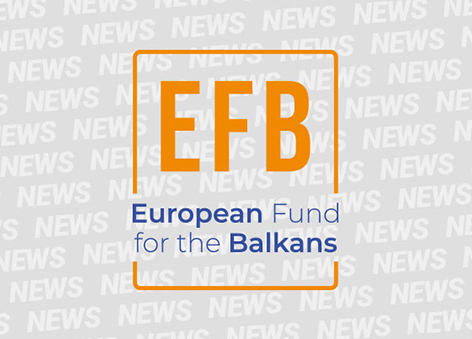
A group of 6 enthusiastic young professionals from Kosovo, Turkey, Macedonia, Romania and Serbia presented the results of their six month research in the field of the regional cooperation through education.
This project was developed in the framework of the “Southeast Europe and the EU – Leadership Development Programme” 2010-2011, organized by the European Fund for the Balkans, College of Europe and Transfuse Association.
The booklet promotion was followed with a panel discussion organized in the EU Info and Cultural Centre in Prishtina.
The topics tangled during the panel were:
Regional Cooperation and Education in SEE
Kushtrim Bajrami, Ministry of Education, Science and Technology, Kosovo
Mr. Bajrami discussed that the education has to be one of the main priorities of the Government of Kosovo. He shared some official information about the very much developed preuniversity cooperation with Albania (sharing the same books), and with Turkish and Serbian communities in Kosovo. Although the University of Prishtina signed cooperation agreements with different universities but the main problem is that the agreements don’t have the concrete plans of implementation and realization.
Gerd Lemke, representative of the German Academic Exchange Service (DAAD)
Mr. Lemke shared some information regarding the DAAD cooperation and programmes in the region. He offered various possibilities for scholarship for students in Kosovo and other Western Balkan countries. He also recommend to student several programmes organized by the GTZ, OSCE, German Embassy and internships in the German Parliament.
Cooperation among the Universities in Southeast Europe
Valentina Qarri, SPARK Representative, Kosovo
Ms. Qarri enthusiastically named the education as the spirit of each society. She shared her opinion that one of the best practices for regional cooperation in the region is network of business centers in the International College of Business, as a good example of professional education.
Challenges and opportunities
Snezana Bilic-Sotiroska, TEMPUS, Macedonia
Kimete Canaj, TEMPUS Kosovo
Ms. Bilic Sotiroska and Ms. Canaj explained some good cooperation cases through Tempus and Erasmus Mundus programs. “Basileus 3”, “Joint EU-SEE Network” and “Erasmus Mundus” are offering a unique learning experience. Through them students have an opportunity to develop their international skills and enhance employability?
The introductory speeches were followed by a lively discussion. The special guest of the event were participants of the LDP Alumni Network.
See the  agenda here.
agenda here.
Extract from the Booklet: “REGIONAL COOPERATION THROUGH EDUCATION” - Research on university cooperation in the Western Balkans region. Best practice examples from the countries of Southeastern Europe.
“Education is one of the most important instruments in terms of regional cooperation not only in the Balkan region but all around the world.Throughout history - even during war times - every nation has established cooperation in the field of education with other states and nations.
Young generations, being the most open to change and new developments, have always been in the centre of this cooperation and solidarity. Thus the founding fathers of European integration and the subsequent leaders put educational cooperation at the centre of the Europeanization process in the countries of the European Community and its neighbourhood.
With this approach, the Erasmus programme and all other relevant cooperation projects are bringing young people together. Year after year, thousands of students are changing their university environment, their cities and even their countries.
Today, this cooperation has gone far beyond the main motto of the European integration - “making war unthinkable”.
Aside from wars and xenophobia, people in the region and particularly the young generation started to create and develop a parallel synergy with democracy and economic prosperity.
It might be argued that the main policy behind the enlargement process of the EU shares the same roots: the spread of cooperation and development. Opening a new chapter and being successful in the after-war era of relations between people is a task that can be fulfilled in the Western Balkan countries only by the young generation.
In that regard, cooperation of the young generations could constitute synergy with the consolidation of democracy and become one of the key actors leading to the reconciliation of the region. As a result, cooperation in the field of education serves the integration of the Balkans into the European Union and can become the main driving force of this process.”







